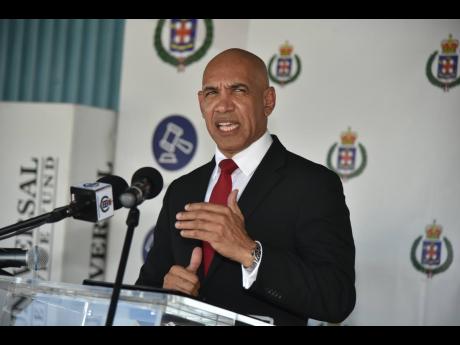Editorial | Positive crime data
There was no chest thumping by the police chief, Major General Antony Anderson, at his briefing this week on the current state of crime in Jamaica, just a measured recitation of the data. Any crowing was behind the scenes by politicians.
Yet, Major General Anderson had good news to report, which, except maybe for hardened criminals, everyone welcomed. For the month of January, major crimes declined by 31 per cent, when compared to the same month in 2022. More significantly, murders, the yardstick by which Jamaicans judge crime in the country, were down 34 per cent.
The police chief’s relatively muted disclosure of the statistics was likely to have reflected his experience over more than four years on the job, and his knowledge of the wild fortunes of crime in Jamaica. A graph of homicides since the 1960s starts like a plain, leading to a softly rising plateau and dales, on to a sharp peak that falls steeply on to a deep valley, before rising to a ragged range of mountains with occasional deep ravines.
The landscape can change relatively quickly. So it makes sense not to extrapolate too much, or appear to be boastful, on the basis of short-term data. Indeed, only days before General Anderson’s briefing, the decline in murders, up to January 29, was 37 per cent, 86 compared to 137 in January 2022.
Nonetheless, there are several positives in recent developments that, especially if sustained, should improve confidence in the constabulary to deter and/or solve crime. One of these is the apparent improvement of the police’s access to, and ability to act on, intelligence, some of which, admittedly, is passed on by foreign partners.
ILLEGAL GUNS
For instance, earlier this month 60 illegal guns were discovered at the port in Montego Bay, the capital of the northwestern parish of St James, which has emerged as a hotbed of gang-related violence. In January, 22 firearms were seized at the city’s Sangster International Airport.
Up to 2,000 guns are estimated to enter Jamaica illegally each year, while the police seize fewer than half that number. That suggests a net flow of weapons of over 1,000 guns into the hands of criminals annually.
However, by the first week of February, the police had seized 130 guns, approximately a quarter (24 per cent) compared to the first five weeks of 2022. This is relevant given that guns figure in more than 70 per cent of all the island’s homicides. They are also the weapons of choice in gang-related conflicts and murders, which, according to Major General Anderson, accounted for 65 per cent of January’s killings.
Additionally, last September the police seized over 1,000 kilogrammes of cocaine at the Ian Fleming Airport at Boscobel, St Mary, and followed that on Boxing Day when they discovered 520 kilos of the drug elsewhere. In mid-January another haul of more than 1,250 kilogrammes was made at the Montego Freeport in St James. These finds are important for the fact that the narcotics trade is also often linked to criminal violence.
Unfortunately, detection of the cocaine has not led to arrests, and in the case of the guns it doesn’t seem that any of the key people involved in the shipments has been held. Which is not unusual. Hopefully, this is about to change.
DEEP ANALYSIS
Another factor in the latest crime data deserves deep analysis. States of emergency (SOEs) were in place only during the first half of January.
For the past five years, the administration and Commissioner Anderson have made the imposition of SOEs (which give the security forces wide powers of search and detention without the need for urgency to either charge or take detainees before courts) their key crime-fighting tools.
However, the government has lost a slew of constitutional challenges to regulations governing the earlier use of emergency powers, including the mechanisms for detaining people and for how long. Further, the collapse of Opposition support for the measures has meant the absence of the two-thirds majority required in both houses of Parliament for the extension of SOEs beyond the declaration for two weeks. More recently, this has meant some have been imposed, then reimposed after their automatic lapse.
However, the last declaration of SOEs in eight of Jamaica’s 14 parishes was on December 28. These were not rolled over.
It would be useful for Major General Anderson to explain if his non-SOE strategies are beginning to take hold and what next needs to happen to fully cement recent gains.
One matter yet to be robustly attended by the authorities is the deep, cultural overhaul of the constabulary, whose resistance to change has historically stifled the positive shoots of transformation, which many people will hope is what they perceive to be springing in General Anderson’s recent data. This can be given impetus, we feel, as part of a reset of the Crime Monitoring Oversight Committee of the government, Opposition and civil society groups that seek to depoliticise crime-fighting and to make it a national priority.

